Outcast Garden
It was ridiculous, but it was. A small “gallery” (in reality: one-artist run space) occupying a desperately vacant, utopian place on the local horizon: dedicated to the beyond-diasporic solidarity of artists who migrated to Germany (in reality: who takes grants from every local foundation for visiting artists' shows instead serving his own needs), conventionally leftist (performing false ageism, uh, false because the person just kept forgetting how old I was and started talking to me like I am a kid again… sexism and paranoid aggression) with a pleasantly title Arrival Room via chats hooked up with me last spring. As a result, I was cheated out of money, and deliberately made some effort to regain my renovation and cleaning skills, suffered discomfort, once or twice even fear, and sweated a lot. To cooperate with this man (although he speaks about himself and his organization as a team, or even a community, in the plural, but, surprise surprise — the local community that actually exists tries to avoid him), so I would recommend to cooperate there only if you have a specifically cunning mood, and know how to somehow screw it up, no more than that.
I played the desperate female-migrant-artist, the owner of the place played the tyrant — that’s basically the story. And in between easily becoming nostalgiс things there were some impressions.
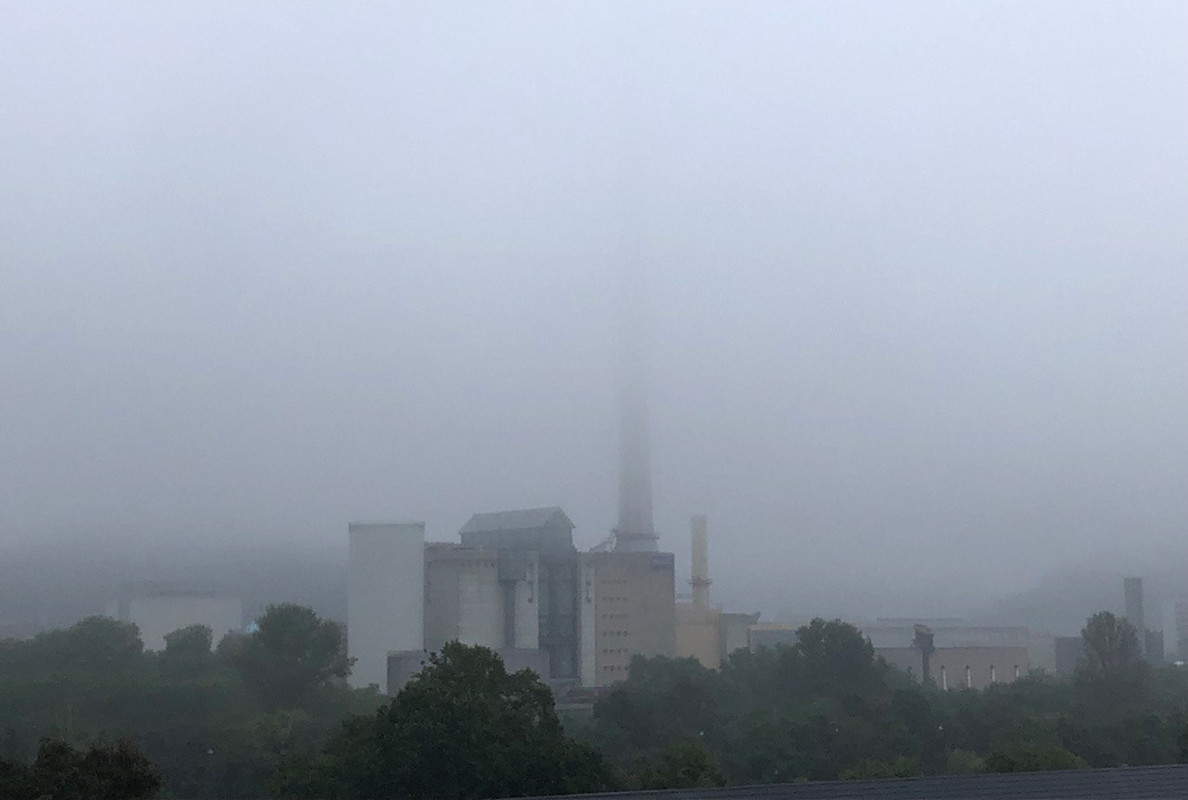
Saarbrücken is a lot like many towns: what’s eye-catching is that it’s been a long time since anyone has heard of it. It is located in a former mining region, such a German Donbass, as S. said. She gave me the email address of E., the gallery owner. Meanwhile I wrote the text backwards from the inside of the storefront with black snow, which is an artificial snow used to draw christmas patterns on windows, only black, and clearly not intended for indoor use — the black dust flew into all the corners, which I then had to clean, and especially eagerly settled on my sweaty face and hands, moreover it was such a summer, the heat was up to 41 degrees, and in order not to melt under the glass, I stayed late, because E. allowed me to create this element of the installation exclusively inside, so it was going slow, I had a blackface, it was long after dark and S. knocked on the glass, because was out with her bestie. They were the youngest people I managed to spot. No university nearby, not many young people either. The gallery windows overlook the stop of the only tram, number 1, but with many variations that mark the endings in different places: 1a, 1b and so on. There was a chance to take one to France, but I was too busy to do so. While various city dwellers knocked, croaked and sometimes puked into this glass out of boredom (so E. apparently had a reason for his request), I was in the middle of writing:
the earth-eaters will be eaten by the earth
and we, too, will someday try the earth
♪ while it’s eating itself ♪
♪ and I can’t think of anything better ♪
so
♪ I’ll eat the earth ♪
I wanted to change the inscriptions every day, but the black snot in the morning forced me to choose. Except for this one above, these were a collection of quotations from interviews, or, more precisely dialogues, or even, therapeutic (at least for me) deep listening sessions, as one curator said, around city-poetic-perceptions… I suppose; from the perspective of a migrated long ago (instead of me) people. I worked on all of it in Genoa a month before; then and there the walls were loud: Free Marcus, free Giancarlo, free the political prisoners, anarchy is not a crime. Turist, death to you. Crack is the new pesto. Sisters, gentrification is not your friend. And the people I was talking to were anything but its writers. So I wanted to turn the situation and put the words of an intimate dialog into the streets, in the context of angry young men. In Saarbrücken they wrote something like I’m Markus, I’m Tobias, fuck, shit, sex, whore, lol. With light trails of sweat on my coal miner’s face, I managed only two lettering sessions. The other one regrettably too banal without context, and its full unfolding requires great diligence. It came from a man who spent years at war, then years as a refugee in one country, then more years as a refugee in another — the first country of exile became unsafe and then ceased to exist, and eventually he became a lifelong double refugee, never having been allowed to vote. In his dreams, passed relatives started to use European languages when he began to forget his native.
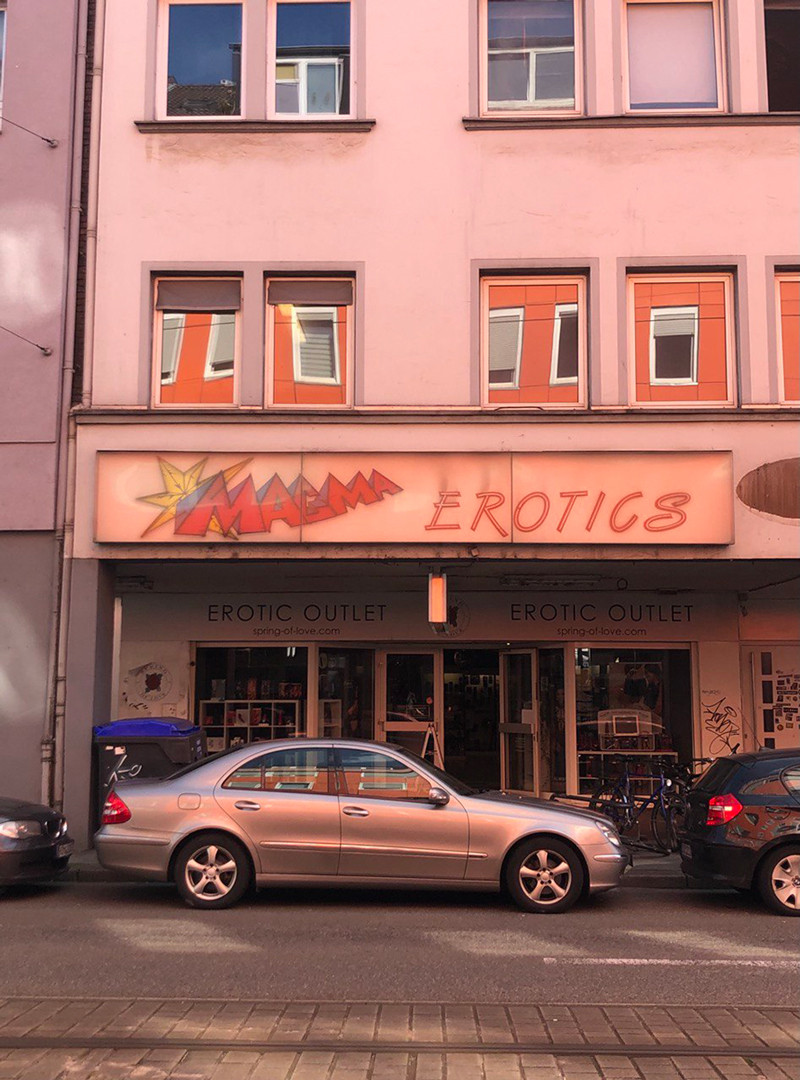
E.'s close enemy came almost every day, banged on the window, pulled doorknobs and crazy-yelled, during the evening promenade along the tram route with his girlfriend (they were from the next doorway so first thing they did was visiting the gallery), she — spit and laughing smeared her saliva on the glass, I was not distressed by that anyway, she just wanted to erase these silly writings, but of course they were inside, so she just played with me like with a fish. It was a punky pensioner couple. One day he wore a SS officer coat over. To estimate the proportions of epatage and lunacy in their behavior was impossible, even if I had understood German well, since they were artists. The following details I collected from E.'s big talks, during which he was waving his arms, reminiscent of a toddler, as they sometimes resemble large men in their forties: shouting and jumping up and down depicting an imaginary battle. The enemy was once exhibited at the place, and as the tales tell, on the opening night he consumed too much and then cracked a window, so he was punished by a police call and following session with a psychiatrist, but, anyway, I suppose these last comings were intended as a warning. I was cleaning the facade with a long mop, and before I could lock, while changing the water in the bucket, the enemy tried to burst in, I started holding the door and call for E., so it appeared to be one of those rare things that could drive E. out of the den where he was doing bureaucratic work done, so he rushed out with an imaginary but no longer toy baseball bat clutched in his raised fist.
E. met S. when she, commuting from one refugee camp to the next, not having been permanently assigned to any of them due to her gender identity, and thus the vulnerability of being beaten in male company and being expelled from female company, was wandering around looking for somewhat cultural time-spending. Straight away he tasked her to find artists from Russia or Ukraine who would agree to exhibit at the site of a major break in the gallery’s schedule asap. Е. evasively video-talked to me a couple of times and on the appointed day lathered up by a deutsche bahn with a series of sculptures in hand-cart I was on the doorstep. He promised me 1,500 Euro: for installation, production & living expenses, but on the first day he pushed me to settle in, the next day abruptly canceled our meeting (the printer broke down), then it was Sunday — the sacred German weekend — and on Monday morning I stood in E.'s face again asking for the space keys and documentation of our arrangements. Page after page, the contract crawled out of the printer (which was feeling better), and E. handed them to me to sign, one by one, when at the very end, on one of the last pages, I got surprised by the fact that my “fee” would be only 400 euros, which I had already spent on clay and the firing of the sculptures. There my hand froze over the paper. The snotty air in the room thickened, and E. began to hastily excuse himself, with the pressure of threat in voice and anger on his round face, saying that he was providing valuable materials and tools for work, paying the space rent, housing, and his PR services… The precious materials turned out to be a plastic box, with piled up rusty nails and dried paint (from E.'s own art practice, which is something akin to zombie formalism, with a hint of 80s, but done in stationery neon colors). …I let you do the project, and bought toilet paper! — Finished E. I raised my eyebrows and he raised the price by 100 euros. I planned to survive two weeks of installation on that, somehow eating and consuming free coffee from the coffee machine near the entrance to E.'s office. Maybe it was then when he started to watch out for me, trying to lock himself in his office, if he appeared at all, to leave early, not to meet my eyes unnecessarily — because I was unpredictable, focused, prepared and agreed: why the hell did I stay, what was I up to? E. slammed in his office, the next day did not come at all (urgent business with a lawyer in another city, yeah, by the way, I have my own lawyer). He had a lawsuit going on with his ex-wife and told everyone what a bitch she was. There was no balcony in the apartment E. had put me in, but there was a persistent elderly stink with earthy notes of expired medicines. I opened all the windows and propped up a few pieces of furniture: fragments of ikea sets, rotten flowers in pots, some random things, made up the ersatz of the living environment. Later I realized that this was the legacy of E., whose parents were actual migrants, brought him to Germany as a child and allowed to go to Amsterdam to study painting. They died, the career slipped and E. returned to Saarbrücken, but it seems he was not too familiar with the rituals of cleaning or airing, although there was a mysterious cleaning lady who only pretended to clean both the gallery and the apartment, but I don’t judge her given E.'s greediness, maybe she actually was the ex-wife? And where did E. sleep now? But I never know. As said by S. on E.'s attitude: as a teenager, he drove a Mercedes and when he got drunk, he would tell stories about it. I slept badly on linty synthetic sheets and lumpy pillows wiped to the other side, the odor was choking me, despite the cries of the forest cicadas outside the open window. Next morning, I arrived at the thrift store even earlier than open hours required, so I spent a crisp wait on their doors, supported by an extra cup of black coffee and a self-cigarette. I bought scratchy cotton bedding, predictably smelling of chlorine, but at least not of death. In general, I now often buy bed linen and towels in second hand, sanitized, they give me more confidence than glossy synthetics from stores like euroshop or teddy, which is like cheap porno-chocolate from the discount supermarket of its own brand, like a disposable bag that has been many times washed. The problem with porn, as Polina said, is that it is overly exposed, leaving no room for play or closeness. Some things are hard to accept if you have any choice, like a reused condom. The towns of Germany, on acquaintance, appeared to be so crowded with overused eras of violence from the surviving Middle Ages and monk’s vineyards to the death camps outside the window of the regional express that they merged into a greyish limbo where distances gave way to hontologies, so all kinds of fellow travelers, including myself of course, became ghosts riding in various directions of retro-futurism. E.’s parents’ apartment building was a large whitewashed concrete, extraordinary fruit of constructivist fantasies from the sixties. The front entrance and elevator area served as a border (there even was an empty customs booth, probably a closet, but with a glass door) between the two wings of OST and WEST, which also had their own staircases, the eastern one of which (who would doubt) led me to the roof after only one flight. It was also a public area for barbecues or sunbathing, residents' meetings, always empty. The bituminous seabed was so heated that even in the morning, over the first cigarette with coffee, it was warming. From the god’s eye view large garbage cans of various kinds added to the half-moon eyes. Stoned on an August night I looked at the shooting stars, the view was encyclopedic: a hill crowned by a psychiatric hospital hidden in the bushes, a hydroelectric plant on the river and the river itself squeezed by the highway. I began to acquire familiar toponyms: an advertising structure resisting isometry or maybe a space installation from the 80s, a beer garden called “Kultur Garten”, and entire neighborhoods: white thrash, hipsters, gothic. This roof rose above the boundary zone of the mansion quarter with the barracks block. For some reason, such houses accepted me, whether for a long time or not, but still patiently: for example, the house on legs in Moscow, reminded me of myself and immediately evoked in me a performative of my former self. Double tautology: I brought with me my little clay houses, literally casts of memories — of Ukrainian modernism and constructivism, destroyed not only by the war, but in total by everything that had gone before, as well. Like an incredible unfinished monument that had no purpose or author, like the hulk of a mammoth in the prairie, this prairie we called burial mounds or “the hillocks”, could be seen from the mine heap (“the terricones”), on which we were climbing, I and my brothers, to run down — to the monument of the killed by the occupants Young Guardians, whose corpses were dumped into the pit of the same mine.
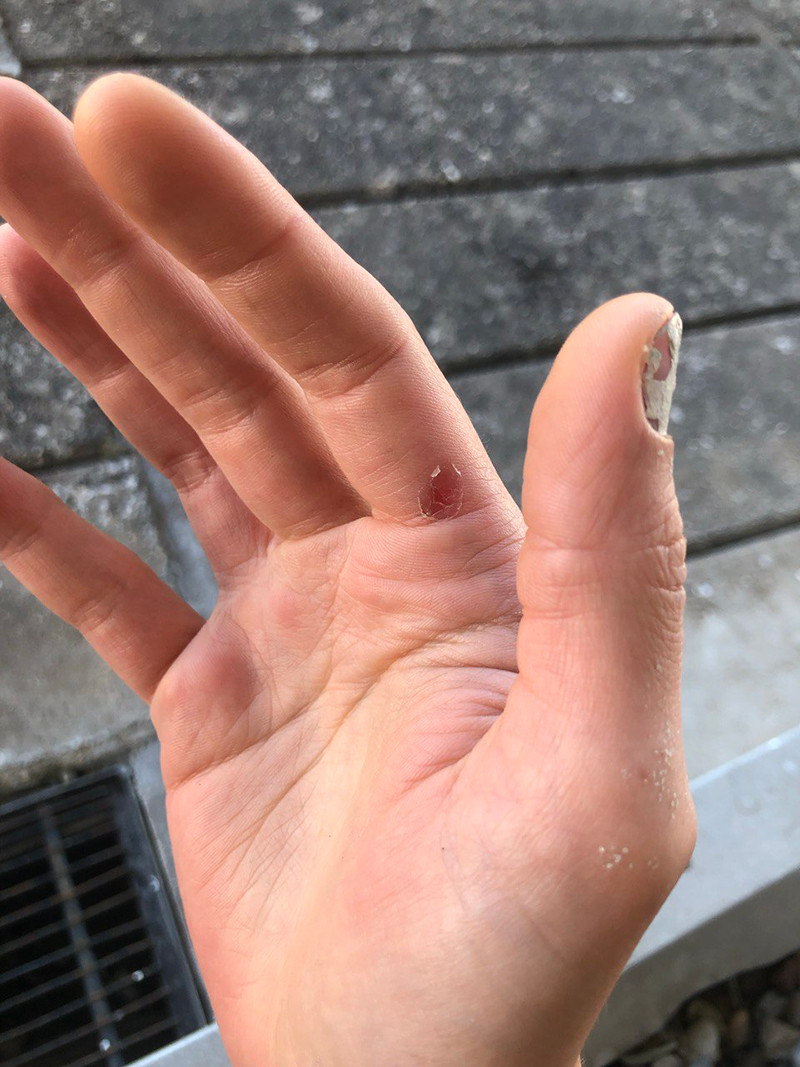
From the apartment to the gallery, a twenty-five minute walk laden with randomly selected pieces of furniture from which I assumed to cultivate our garden, or the same amount of time waiting for the bus. I inventoried everything: used screws and other accidents from a drawer, acrylic stains on the laminate flooring, scraping each one off with a super-blade for induction stoves, the milky yellowing sockets, boards and shutters that had been waiting for a treat since the two-thousands years. The cleaning lady didn’t show up and E. growled — that wasn’t part of the deal! Getting into some kind of rage I dragged and drilled and peeled and swabbed, sprayed and scrubbed. Hypsocardboard walls revealed a starry sky of holes, I spackled and plastered, stuck toilet paper in them, taped up and then painted — that Euro-repair rubbed my hand with the roller. The found objects were found on time, washed, fused and painted to form new configurations. Micro-architecture served as a setting for my little totems of the big. I purified myself by labor to present to an imagined community of others, yet so similar… Everything was said, written, molded — I had been working on a series of sculptures and open-calls applications for about a year, it was left to reveal. E. sometimes put on some music, house of course. It didn’t particularly matter, as any music contributes to the finishing work. Hours of meditation were interchanged with proletarian walks in paint sweat and abrasions from wood chips, roped with an anti-fascist slogan with the key to the gallery around my neck (you’ll pay dearly if you fuck it up!), to the supermarket. It was truly important to take care of the key, especially in the context of a becoming more and more virtual presence of E., who was very annoyed by the tram-waiters falling asleep on the entrance step, which I tried not to disturb and went out to smoke through the window into the courtyard. But in order to go somewhere further away, once or twice I had to push over some sleepers, one of whom was unironically decorated with multiple swastikas (other passengers helped me). In the evening, online German lessons and a reading group about politics: necro- and chrono- were already waiting. It turned out to be ecological in all dimensions, except for the time of my life. As soon as I slowed down at the zu verschenken (the sponsor of apartment furnishings in many dwellings), an old man in a white shirt and gold frames, climbing out of the patio, began to instruct to me the purposes of the sweaters in a cardboard where I was digging. I ran out of all my clothes but a predatory blouse and pants, which I wore while hanging around waiting for the only laundromat open after 18. Inside was a poster of my show, hung by E. as he raced around town after the heat of the day dropped. While I was reading the manual, the only drying machine was occupied by some lumberjack, so I dragged myself with a wet back. All the forces were distributed, worries (last week I had to remove two teeth, and in the fall will need money for implants, my husband was on the verge of a nervous breakdown, and then beyond it, the financial or at least paper well-being left much to be desired) overshadowed by the job, so E.'s aggression, the oddities in his behavior, the established non-communication between us — all this I was decidedly lazy to analyze. One early Saturday morning, arriving at the gallery, I asked E. for the password to DNS, which he had promised to give me the day before, via WhatsApp, in order to reset the router and eliminate problems with the Internet “at home”. But suddenly his face twisted with a grimace, like a sagging closet door, claiming that he had to check the safety of his, his personal! real estate, jumped on his bike and rode off. He clearly had a speed advantage, so I stayed. Then he phoned, yelling that I was smoking inside (which wasn’t true), that he was going to sue me for damages, and all that sort of stuff. Not that I was exactly scared, but a little shaky, the possibility of direct violence whether I was scared or not was there, and I was afraid that I had misjudged the situation, with my dulled dreamy senses, but still nervous about the laptop and documents left at the place. Just by the way, E.'s mate came along and had to say hello to me in absence of the owner. He was the beer, martini, and vodka supplier for E.'s office mini-fridge. He had a bicycle with a sidecar for cases of booze, a quiet and calm voice, a family-type face. I decided to use the occasion, without need to pretend my hands were actually trembling while I poured him coffee from the coffee machine and asked for advice. He promised to chat with his buddy, I was temporarily satisfied and wrote to E. “I never smoke in the apartment, I know what the mandatory smoke detectors in Germany are, I own a couple myself, and if you find cigarette butts in the trash, it’s because I sort and collect all the waste, and the windows are open because this apartment stinks!”, and only a day later I got a reply: “My apartment does NOT stink”. I laughed.
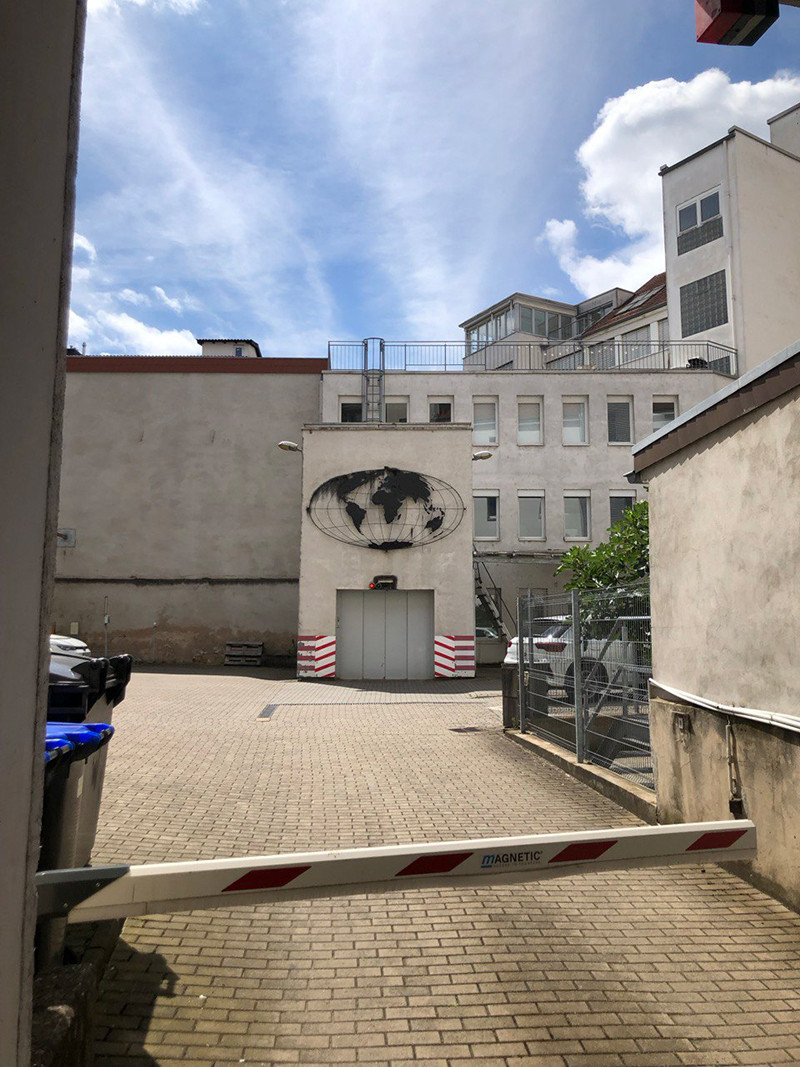
Only through the translation by S. I learned some of his troubles. Not that I have any negative views on drug users, but E.'s behavior was unintentionally enriched for me with additional logic that I was even sort of capable to relate. His disappearances, resetting of the previous agreements, temper, changeability of statements and budgets. E. constantly forgot the essence of my project and also my age, almost at every meeting he asked me anew to report not only on what sort of work I would be doing and what materials I would be buying, but also “what it was about”. He didn’t ask how old am I, and I didn’t correct his manners, well, he had several copies of my cv in his mailbox (the request to send documents was also repeated), and at the end of the week, when other adults came to him for a beer and important confidential matters in his office, I told him out loud, and then E. was so shocked that he repeated several times: 33, 33, 33, wow, and this is 33! He asked if I was familiar with the chto delat group, I invariably answered that not so close. Such an answer slipped off the understandable (options: proud of familiarity vs proud of slavic roots) and after a couple of hours or days the question returned. Senior comrades in integration will always look at me with the slyness of transcending experience and I can’t outrun them, that track record goes nowhere here. Sometimes I felt youthful and nullified, barely looking, as if for the first time, at the rules of life, such as the fact that initiative is being punishable. I always turned away, E., on the contrary, kept a little greasy chuckle of German-humor in his pocket so that he would drop it casually, to show off. In the course of a one-minute rant, he went from of course the installation will be safe to I couldn’t care less if your shit falls. In the end he made a joke exactly as I expected — he changed some of the seats (cafe-like, dusty ochre, nostalgic) that held the printouts at the entrance to neon aggressive chairs of the noughties. And while the show was going on, one viewer (perhaps the only) sent me a photo, and I in turn scared the shit out of E. Did he know what was really scary, or after taking a good resident’s class, somewhere in the process of a citizenship test an electric shock burns out everything but yokes and quotes? E. had his own great statements, he was selling them, modestly signing with the name of the gallery.
a sticker: There is no local or migrant art, there is only art. Arrival Room.
a T-shirt: Bitte nicht nach Hause schinken! Arrival Room.
a Postcard: A place for art and integration. Arrival Room.
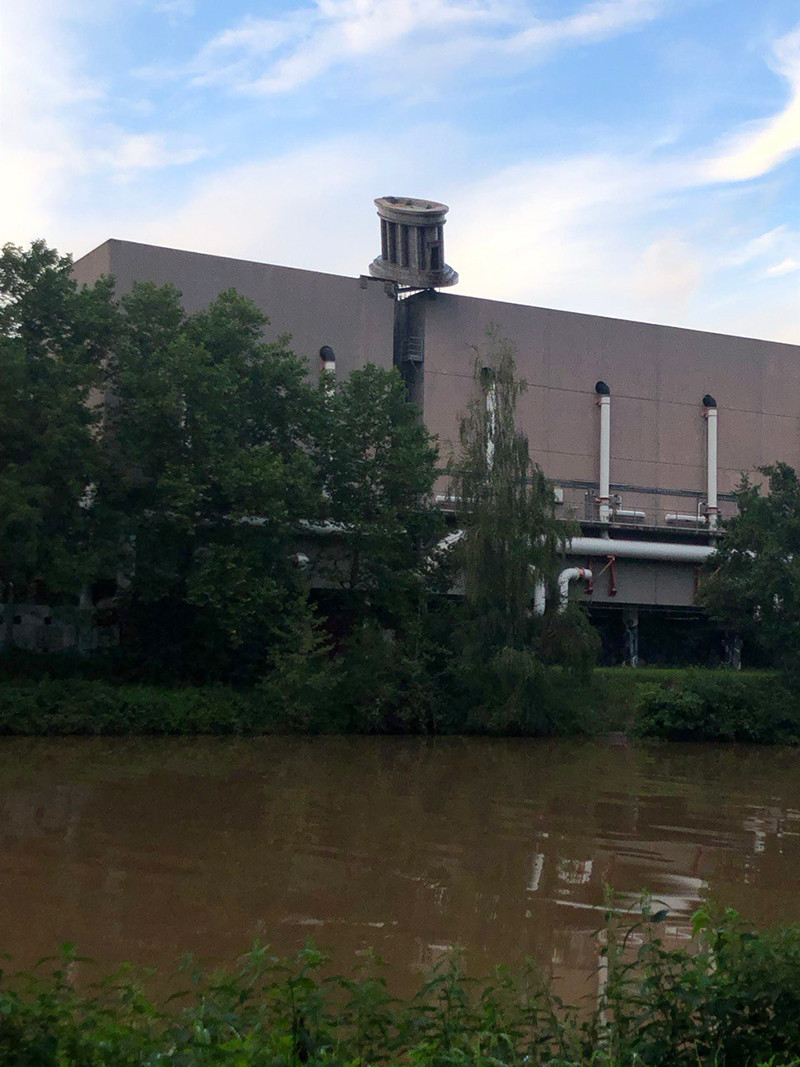
I finished this residency-experience abruptly earlier than was expected, though the floors were double washed and the expo fixed on my looks-like-Bratkov’s-Sony-camera. As usual with many transfers I got a brief one day break at home, and so at the end of the week we arrived at the opening. E. sweetly requested what kind of music I liked and immediately put on noughties disco remixes. Nobody came, only four respectable ladies, me, Mark, in the corner of the vestibule all evening playing gameboy on his phone, and E. with a grand glass of vodka-martini. Without prior agreement we served each of the ladies in perfect unison: I showed the works, explained meanings and listened to comments. Then E. poured them wine and courteously surrounded them with chairs taken out of the plastic tower. The first woman was a reporter for the local newspaper, in her 70s, wearing a playful dress, black with large fancy flowers, ridden up when she stood on a chair to take a picture of me from an unusual angle on her phone, came by bicycle, doesn’t miss a single exhibition, wrote a crazy article, luckily left behind a paywall: something along the lines of “ Anna’s father’s rosary from Kharkov under the bombs in an exiled garden”… The second and third were an athletic lesbian couple, blondes around 60, with German-Czechoslovakian stories, a neuro- surgeon and the director of some kind of museum I forgot. They were ladies with class, the kind of dames who advise you to learn about some ceramics collection and can give a witty political quote; they quickly left. The last, who didn’t seem to speak English or didn’t need a comment, with the stamp of an uncertain migratory past, in a floor length boho dress, was sipping her wine while chatting with the first lady for a while. Having finished with the excursions, I and Mark let ourselves out.
S. forgot to come, not purposely but my gentle reminder was also too late, so next and yet last time I saw her and E. was a month later, when I came to rescue the sculptures from E.'s subordination. It was drizzling sharply, freezing, all the trains in the series were late by unequal intervals, E. muttered that I owed him a cleaning job and, as usual, ran away. S. helped me stack the works and hastily erase the black poems. I went out smoking, and S. stayed a moment to then pass on a last E.'s burst on my account “She’s terrible at communication!”
But that after-opening night a feeling of lack, which is besides common for any after-, led me and Mark to the place on S. advice. It was a tiny leftist bar, with a central part occupied by a billiard table. The game cost only one euro coin, but we didn’t hope for it, sucking our beer pressed up against the stickered wall between two slot machines, while the regulars were challenging each other and betting, distributing places in the queue, the speakers were crackling with old-school hardcore, a screen slideshow was running hanging in the corner — all the same people from 15 years ago. I remembered the spirit. It was like a sitcom in an alien language, where we were lucky to be extras. Or my sister’s group of friends in Kyiv about twenty years ago, where I had also appeared in episodes. And a chain of many other companies I’d been in a passerby.
